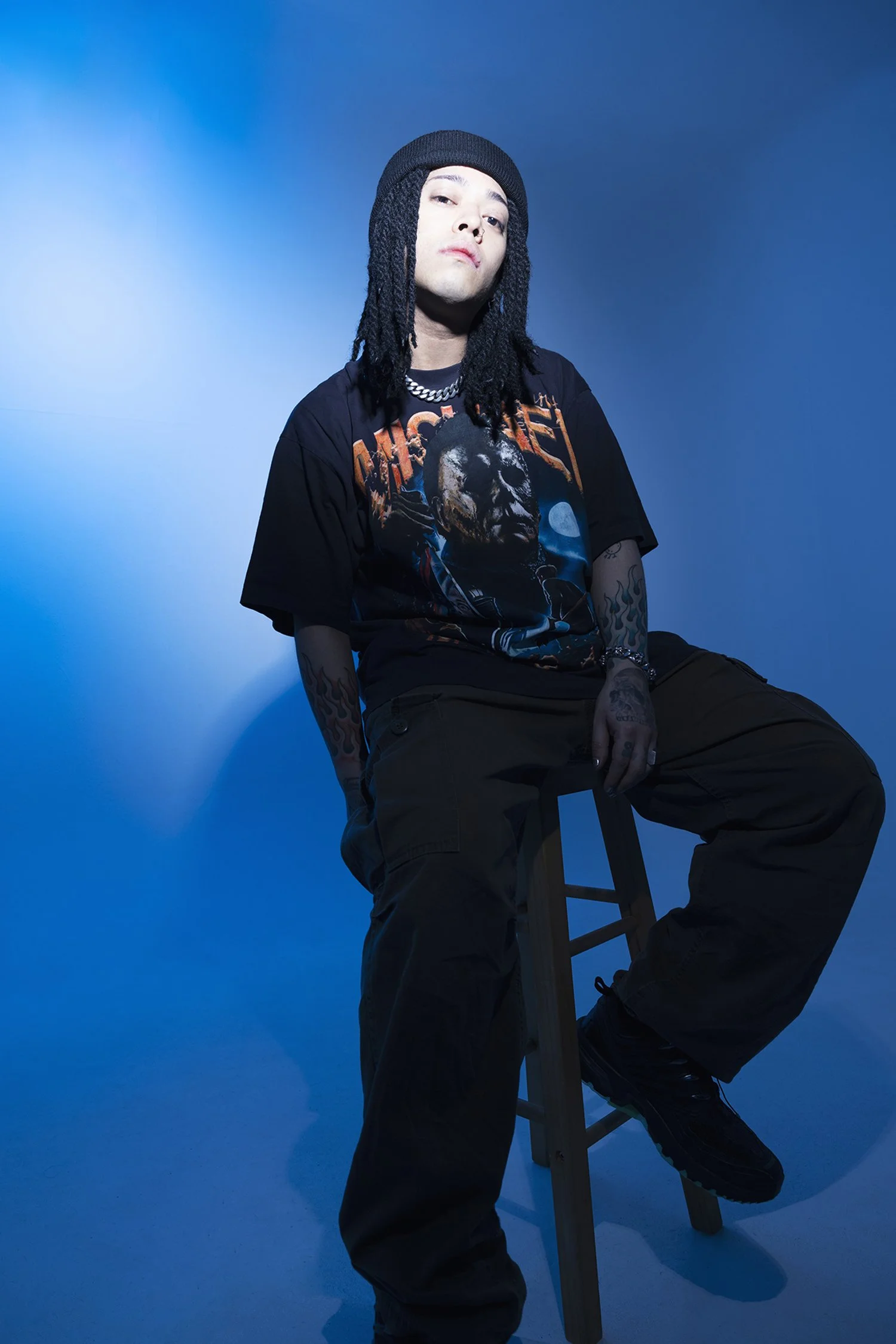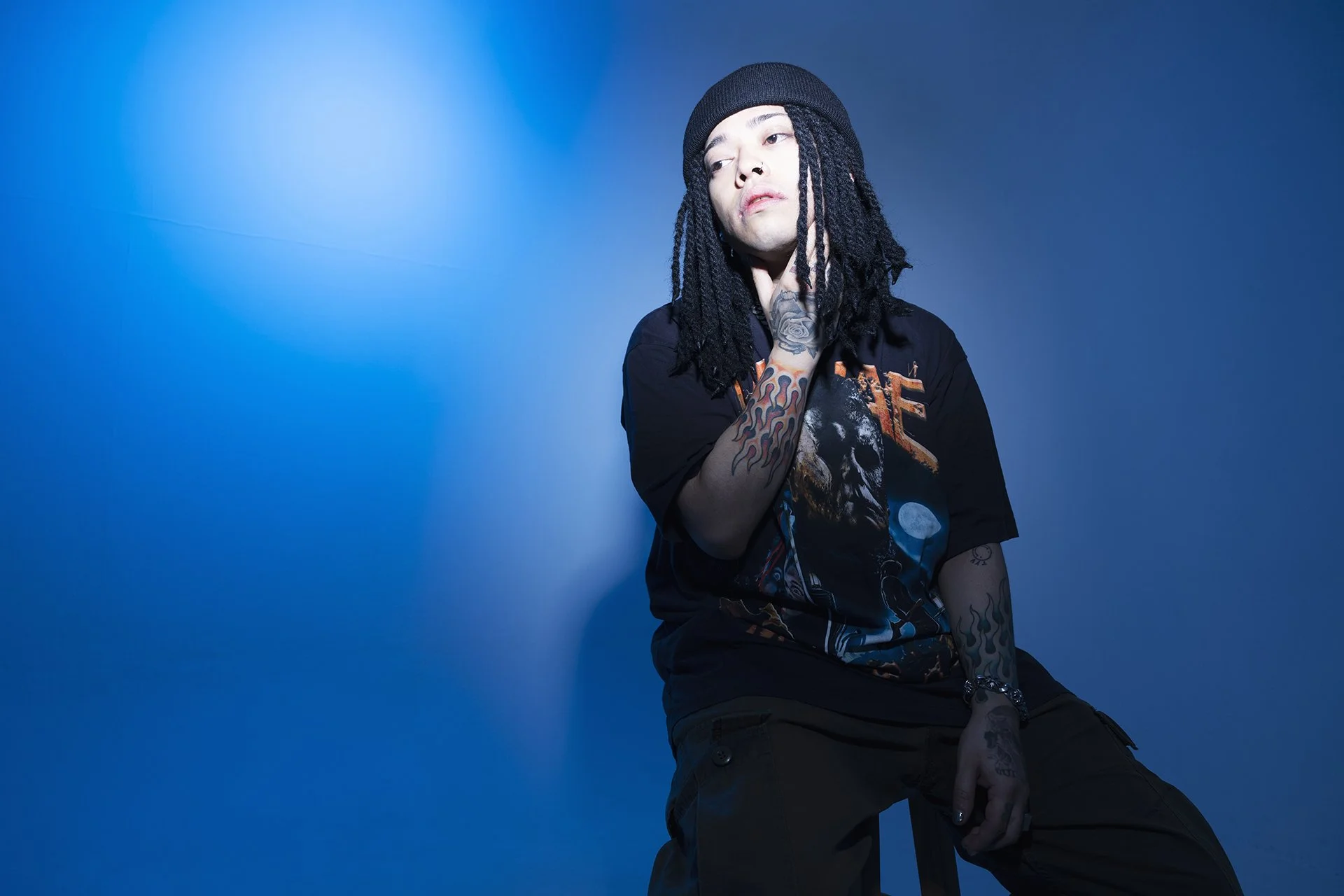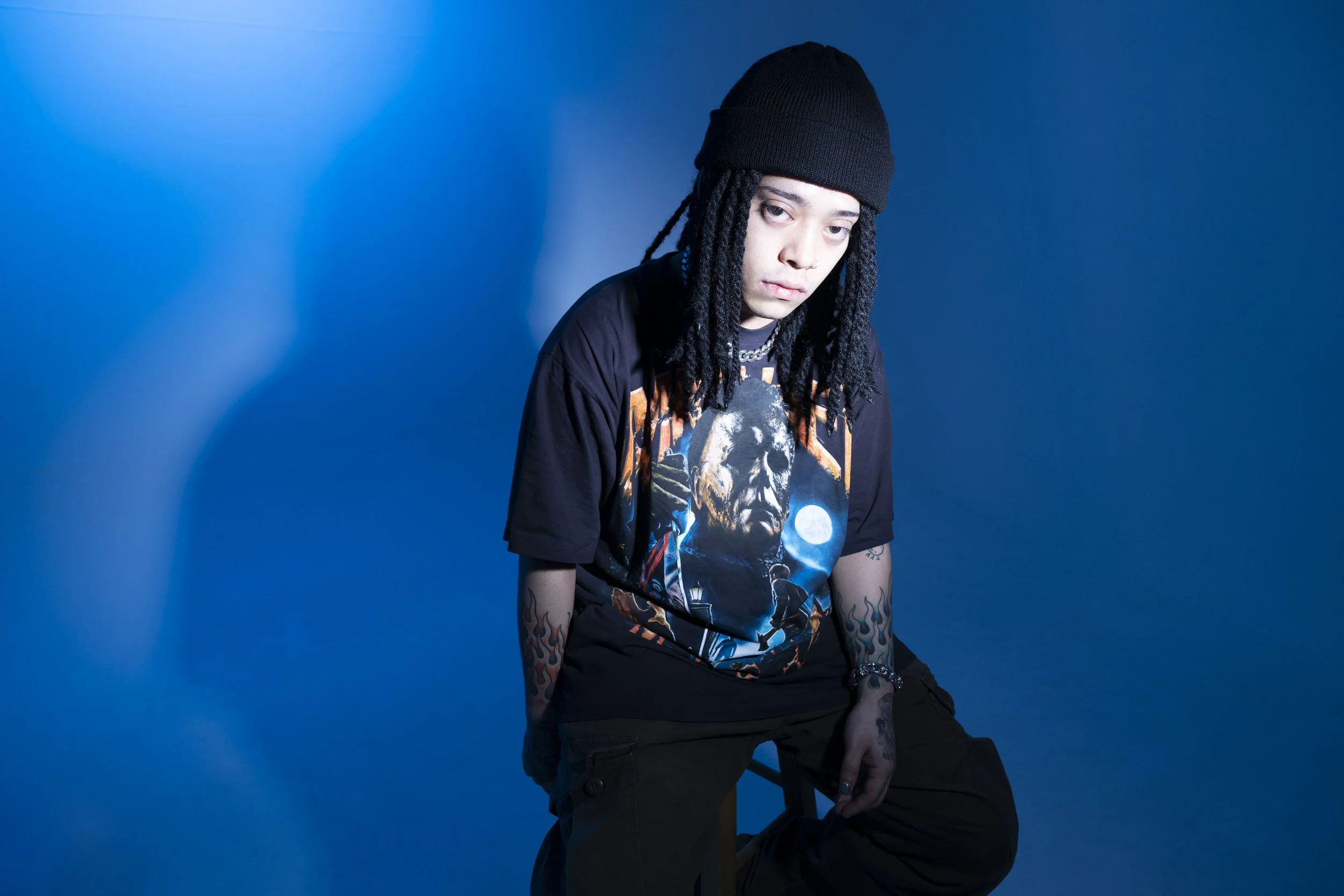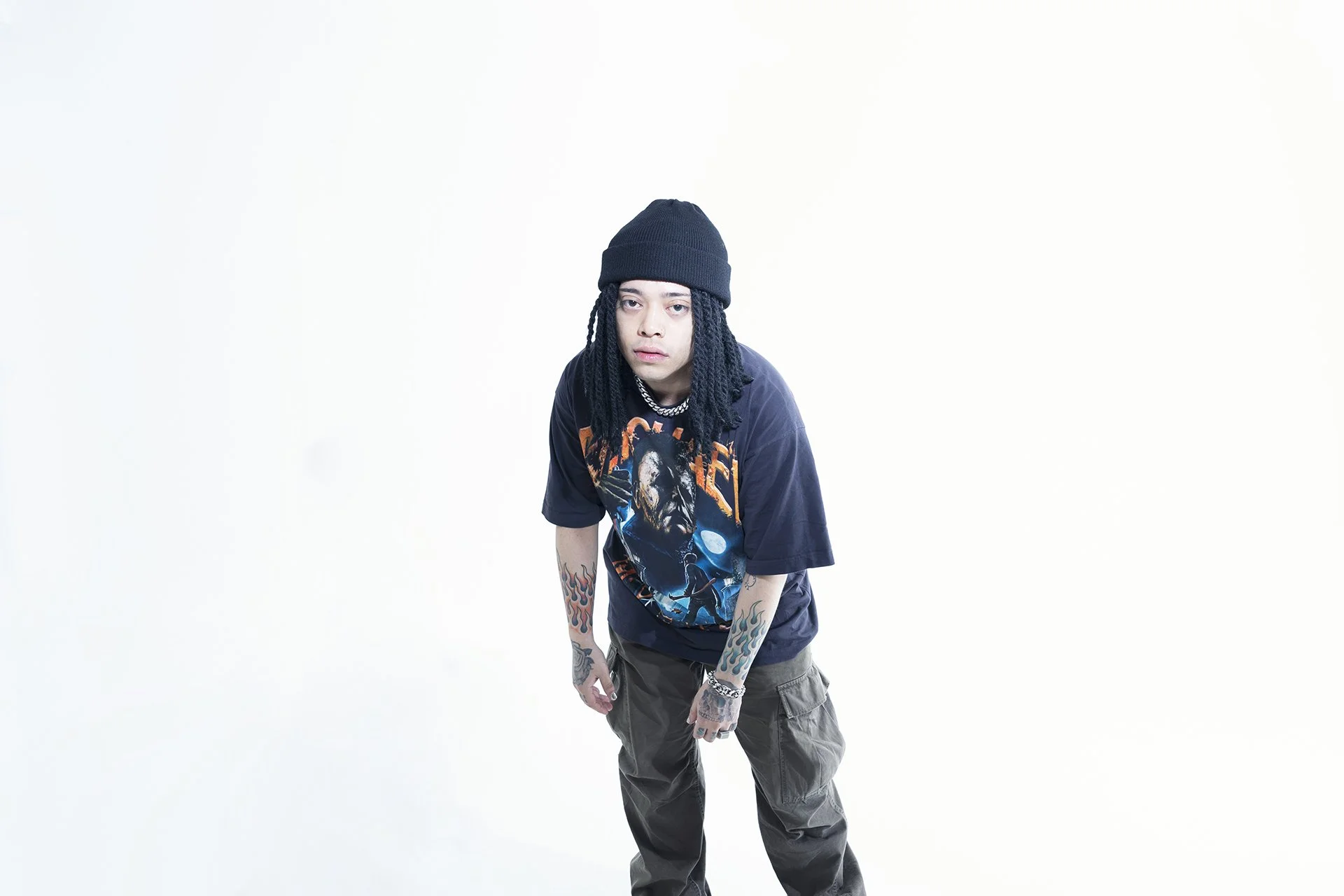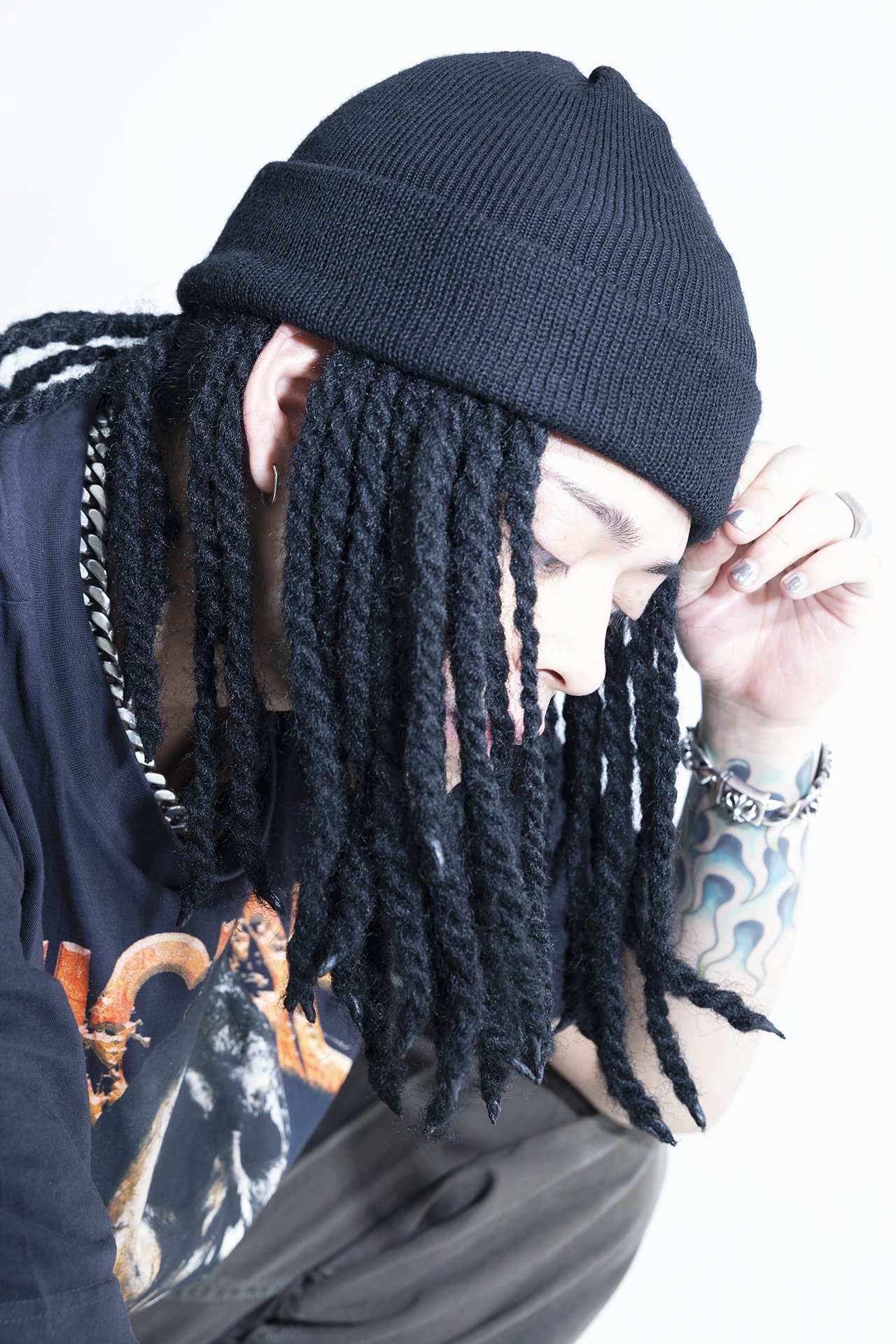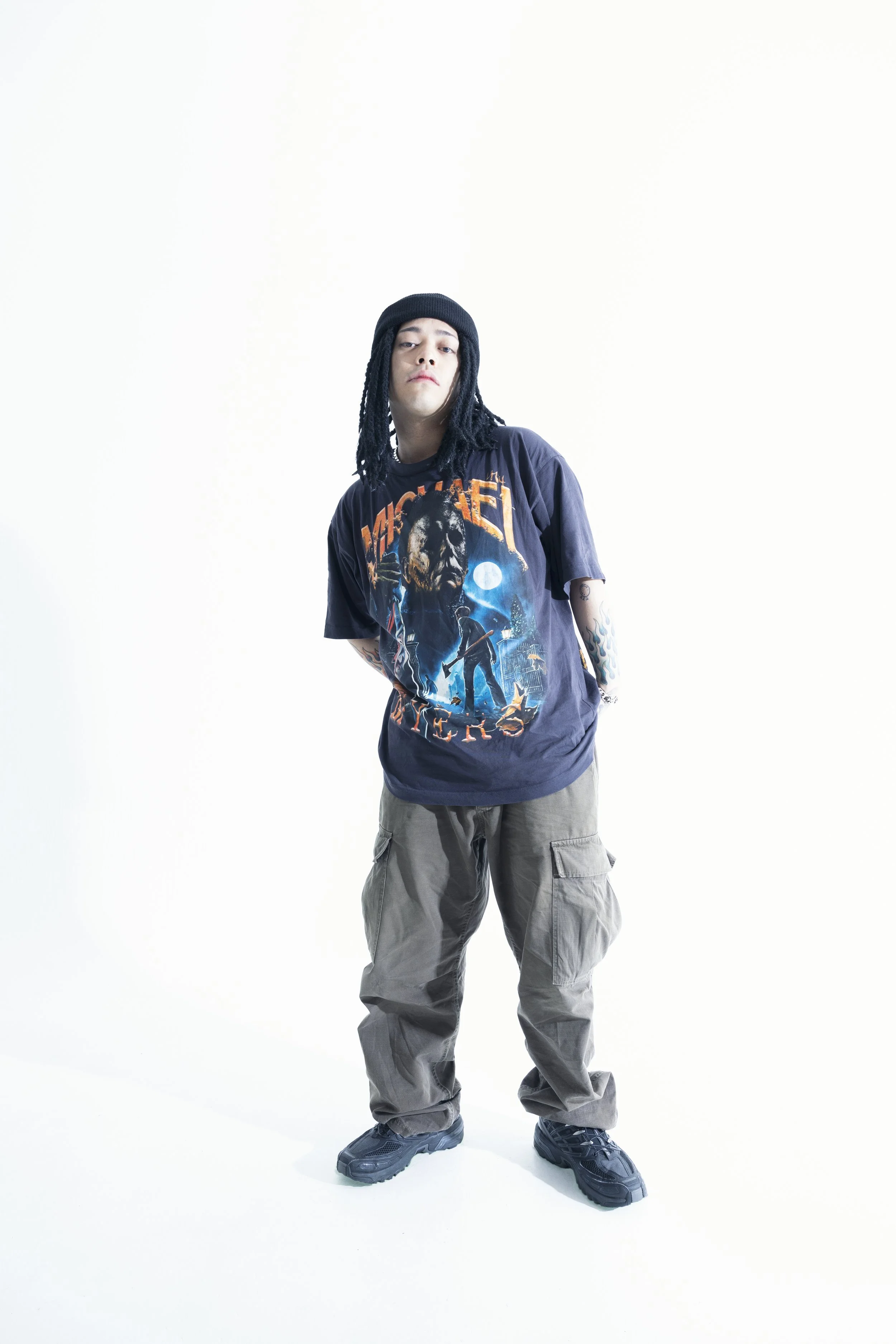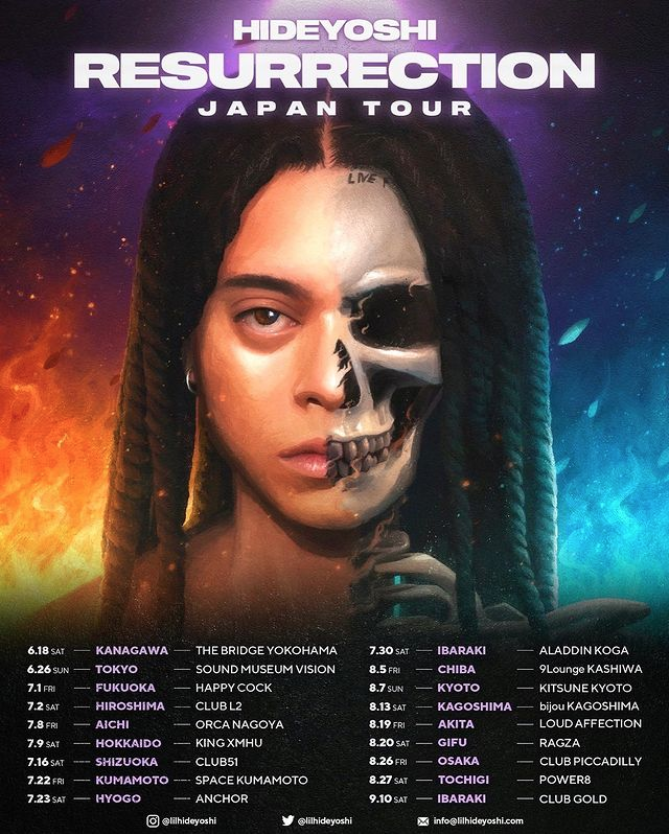
hideyoshi
The Freedom of Self-Expression
Text & Photo: Atsuko Tanaka Edit: B SABURO
The third guest of ELITE SESSIONS is Hideyoshi. Influenced by his older brother, he grew up listening to punk, hard rock and hip hop from an early age. He began to rap when he was a high school student. Soon he got recognized by participating in a high school student rap competition, which led to his single "My Type" and EP "Never Be the Same" in 2018. "Majinahanashi" which he released in early 2020 went viral and currently has more than 7.5 million views. His unique rap style and perspectives have gained a lot of support worldwide. He just released his first album “Resurrection." We talked to him about the thoughts he put into the album, life in general and what he has learned through his career.
-Tell us the concept and theme of the album.
There is no clear concept in particular and I took whatever I felt at that time and put it together. After "Majinahanashi" hit my songs were heard by a bigger audience. Since then I continued to make songs but as time passed my way of thinking had changed, so if I was unsure about something, I proceeded little by little.
-What is the meaning behind of the title "Resurrection"?
People asked me when will I release an album. It’s been about two years since I released the previous EP, so I thought “Resurrection" would make a good title. It is also an indication that "I'm back in the scene again". After I put it out I got messages from people saying that they were inspired by it. That gives me the motivation to keep going.
-You used track from various producers. How did you choose them?
For dubbybunny and ZOT on the WAVE, I’ve known them for a long time and I really like their sound so I asked them. For Kazza from UK, I listened to a song from AJ Tracey and thought his beat was insanely good, so I DMed him and he connected me with the producer Kazza from the UK. He already knew about me and we decided to work together.
-Do you always contact the beatmaker when you hear a beat you like?
Sometimes I contact the producer directly and sometimes I buy them on websites that sell beats.
-How did you like working with the featured artists?
It was the first time to work with everyone except Jin Dogg. Since I chose people that I think cool they were just awesome to work with. They have a lot of really good verses and they gave me something much better than I expected.
-Did anything impressive happen during the production?
I didn’t have much experience working with other artists besides my crew when I worked on the previous EPs and mixtapes. It was exciting to see each others recording method. Recording with YZERR was documented by GQ, so that was kind of fresh.
-Which song do you like most?
The song "euphoria" that I made with Jin Dogg. I started thinking about the concept of the music video when we were recording. I could clearly see what I wanted to do and that made the song meaningful. For the music video we shot it in an amusement park that was out of business and used circus performers. The idea came from a pop-punk music video I used to watch when I was in elementary school.
-What do you want your fans to feel through the album?
I think each person feels it differently. I hope that they can interpret it as they like and simply enjoy my music.
-So, go back to your past and tell us about your childhood. You are from Funabashi, Chiba. What kind of environment did you grow up in?
Until the 3rd or 4th grade of elementary school, I think I lived a very good life. I would go on a trip on every weekend and would travel abroad once every six months or so. However due to my father's work change, our life changed drastically. We couldn’t pay for electricity, gas and water. My parents divorced and after that I was raised by my mother.
-That must have been hard. What were your parents like?
My mother is Colombian. She has some some tough parts, but she is a very sweet person. My father doesn't speak much.
-Did you have any dreams for the future back then?
I liked professional wrestling and watching WWE. I thought I wanted to become a professional wrestler. I gave up at some point because I stopped growing. Around that time I started skipping school and watching YouTube on my dad's computer. One day I saw "Like Mike" by Lil Bow Wow and his music video "Basketball" with Fabolous. I was impressed that a kid could do such cool things. Since then I've been watching and listening to lots of hip hop on YouTube.
-How did you spend your days in junior high school?
When I entered a junior high I moved to Minato-Ward, Tokyo with my mother and brother. I had an image that people in Minato Ward were elite, but that wasn't the case at all. There were quite a lot of kids from single-mother families living in public housing and children who had been kicked out from other schools. That made me feel comfortable. At that time I was dressing like a typical bad guy, but I wasn't that bad.
-Were you stil listening to hip hop at that time?
Yes, and at that time I got to know Japanese hip hop. My classmate lent me a mix CD called "JAPANESE HIP HOP HITS" by DJ HAZIME, and then I realized that Japanese hip hop was cool too.
-Which artists have you been particularly influenced by?
TOKONA X. He was rapping in the dialect of Aichi, and I was impressed by his presence and coolness.
-What made you decide to rap?
I’d been getting in trouble and causing my parents a lot of grief and stress. At that point I started thinking about what I really wanted to do with my life. I'd been listening to hip hop for a long time, so I thought I'd start rapping. At that time, there was a high school student rap competition and I thought that if I appeared in that it would be good promotion. Since I had never rapped before my friend introduced me to rappers like Weny Dacillo and Vingo. We started getting together and cyphering at Yoyogi Park.
-Did you feel confident rapping?
I didn't know how good I was then, but it was fun. I might have been overconfident lol. When I applied for the rap competition, I got in but I lost. Even when I lost I got cocky because I was on stage. Eventually I became more upset about the loss and I went out again, but I lost again. I thought rap battling was not for me.
-What happened after you graduated from high school?
I started working for a fashion brand that provided me clothes. At first I thought I didn't understand why people paid so much for T-shirts or hoodies, but when I saw the employees wearing them I started to think they were cool. Then half of my salary was spent on clothes and I was barely making a living.

-Did you keep rapping at that time?
I worked about 6 days a week so I couldn’t focus on music much. When I saw my friends Weny release an EP and start doing shows, and Vingo joined BAD HOP, I started to feel frustrated like I was left alone. I wanted to get out of working life so I started going to the studio and produced songs in my day offs.
-What was the turning point?
I released a single called "My Type" and the EP called "Never Be the Same". I used to go to clubs a lot, so I made friends there. Through my new connections I participated in SKY-HI's songs and performed at AK's Budokan concert as a guest rapper. I realized that connecting with people means a lot. I made a mixtape with the songs I made during that time, and put out the song "MAJINAHANASHI".
-How did you feel when "MAJINAHANASHI" became a huge hit?
I was so surprised. When I first put it out it got about 10,000 views and there were some comments like "anyone can make this kind of a song", so it hurt but I knew I'd do better next time. Then a Russian person with about 100,000 followers posted something like "This Japanese rap is so cool" and it spread more and more. Some American music site featured my song, and it continued to spread. I even got a DM from DJ Carnage. I didn’t notice it at the time so I missed replying to him, but I was really happy to hear from people worldwide.
-I see most of the comments on your YouTube are from foreign countries.
About 60% of my YouTube followers are from overseas. There are some comments I can’t read because of the languages, otherwise I would check their opinions.
-What did you do after "MAJINAHANASHI" became a hit?
After that, I released a single called "Jitsuryoku". I was happy that the number of people who like my music both in Japan and abroad increased. That was my first time to do a song with ralph and Leon. I hadn't known ralph then, but when I heard his song and saw his videos I thought they were really cool. I went to see his show and spoke to him. We talked about doing a song together. I wanted one more feature and since I haven’t done anything with my long time friend Leon I thought it would be nice to have him too.
-Many of your songs title are in Japanese. Do you intentionally do that?
I make up the titles pretty quickly. For example, in. "Jitsuryoku", I say “Jitruryokusyugi” in the beginning and ralph uses the word in the end so I thought "Jitsuryoku" would be good. For "MAJINAHANASHI", in the hook I say "Majinahanashi", so I thought that would be it. I try to use the English alphabet instead of Japanese so foreigners can read it too.
-I think that that many of your hooks are very easy to remember, which seems to be a characteristic of your music. How do you come up with them?
I listen to the beat and start humming. Humming is not complicated and easy to remember, so I think that's just right. I make the hooks first and then a verse, so I think it’s pretty simple.
-I thought your song "Shinpainai" is very necessary at this time. It really helps to cheer people up including myself.
This song got better and better because it features AKLO. Actually, I first met AKLO when I was a junior high school student. I ran into him walking in my hometown and went up to talk to him. When I entered the high school student rap competition, AKLO came out as a guest performer and we talked again. We met again when I was an extra in his music video "RGTO". It's been about 10 years since I first met him, and now since I’ve grown as an artist I thought it would be cool to do a song with him.
-Looking back on your own achievements, how do you think you have grown so far?
I don't know if I’ve grown a lot, but I think I’ve been progressing. I learned from people around me like the president of the fashion brand I used to work for. I’ve also been inspired by AK, SKY-HI and others who have been extremely successful. I learned how to think and act from them and I grew with it.
-Are there any specific influences that mean a lot to you?
I was talking to YZERR and I was impressed by the fact that he was thinking of raising the level of the Japanese hip hop scene, not just for himself but for everyone. He is a great person who is doing various things to make the whole scene better.
-Have you ever felt frustrated or depressed in your life?
Around the time I participated in a remix called "SUICIDE" by BAD HOP. My female friend who appeared in a reality show committed suicide and I was so depressed. Since I was a big fan of professional wrestling, I used to go to see her matches with my brother. She told me she would come to see my show and then she committed suicide soon after that. I wondered if there was something I could do to help her and had so many thoughts running through my mind. The theme of the song I did with BAD HOP was suicide and it was so hard for me to write the lyrics. Eventually I came up with a verse that I hope will help uplift people that may be feeling down.
-It was a very painful event. So, do you think the Japanese hip hop scene has changed since you started rapping?
I think it has changed 180 degrees. At the time I entered the high school student rap competition Japanese rap wasn't for the masses yet. However, the number of people watching the rap battles increased, and the bigger MC battle show "Freestyle Dungeon" was created. When it was on TV, the scene became even bigger. After that "Rap Star Tanjyo” and the hip hop fest like “POP YOURS” came out. There is always a music genre that is supported by young people in each era and I think hip hop is the most popular music among young people in Japan now.
-Is there anything you wish the Japanese hip hop scene would change?
I hope it will continue to spread. It's connected to so closely to fashion and I think it's good overall. I hope we can continue expand the scale and everyone who works hard as a rapper can make good money and live happily to some extent. Some of them are already in that situation so I hope it becomes more normal.
-How would you describe your musical style in one word?
I think it’s "freedom". I don't want to get caught up in one direction, so I make songs however I like. I’ve branched out in various directions in this album and it might not be consistent as a whole but it’s an expression of myself.
-What is your favorite lyric?
It’s "Kazoku wo tsureteku teppanyaki (I’ll take my family to teppanyaki)” from the song "Makes Me Happy". I actually took my family to teppanyaki around the end of last year. My dad used to take us to teppanyaki when I was a little and now I can do the same thing. I think it symbolizes the change in my life, and in that sense the lyric is impressive.
-What is the most popular word you use these days?
It’s "power!" I often watch Nakayama Kinnikun’s videos on YouTube with my friends and I always think he’s funny. When I can’t find good words when we toast each other, I can just say “power!!" That makes people cheer up too so I think it's working.
-What kind of person do you think you are?
As I get older I’m getting used to various things and my emotions are less likely to impact me like when I was younger. So in that sense I would say I’m "broken". However, I can be passionate and I intend to live openly. Also sometimes I can be cold and complicated. I'm timid, but also impudent. It’s hard to find a few words that easily describe myself. But that might be why I’m able to express myself better in song.
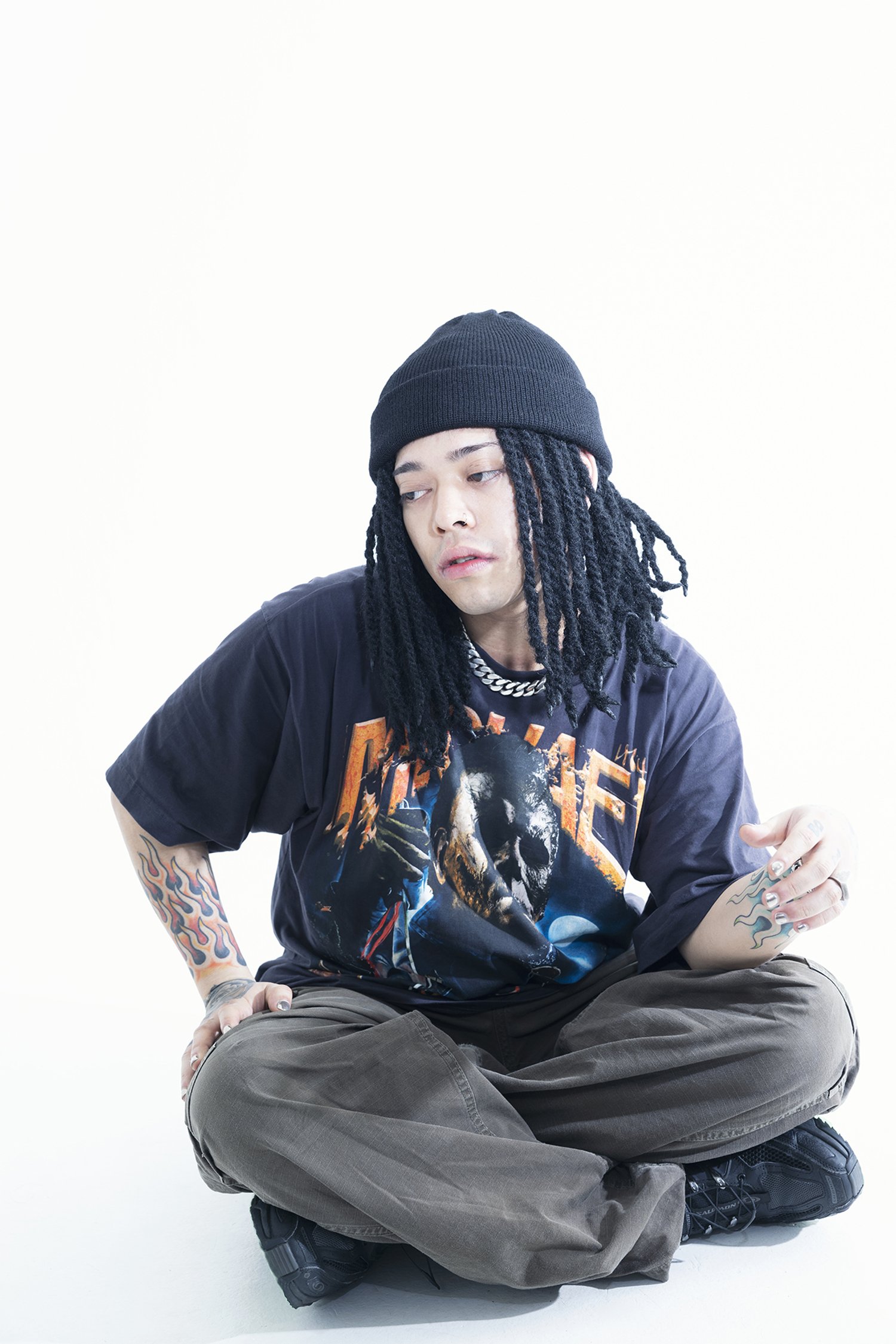
-What do you think your strength is?
It's difficult because there are so many talented people, but I think I’m good at what I do. Also, I don't want to be cocky, so I always try to be humble.
-Who do you respect or admire?
I have a lot of respect for Kanye West. He seems unstable as a person sometime, but I think his talent to create anything from music to fashion is always amazing.
-Are there any artists you listen to often nowadays?
I like AOR and I often listen to Bobby Caldwell's songs. I play songs on YouTube that were featured in cigarettes commercial in Japan in the 80's and 90's. I like relaxing music.
-Who would you like to collaborate with in the future?
There are a few famous overseas artists I want to make songs with, like Octavian from UK and Burna Boy from Nigeria. It will be so cool to work with Kanye too of course.
-Tell us what you are currently interested in.
In the last few years, there have been various things such as Corona, the war between Russia and Ukraine. I’ve seen that it has affected some of my friends. Some of their parents had to return to their country, so I really hope that everyone can find a way to live in peace and happiness.
-What about your dreams and goals that you would like to achieve in the future?
For the time being, I would like to visit more countries. I think I have to absorb various things by going abroad to see the scenery, making new friends and learning different values. I want to go to Europe, especially London, Paris, Amsterdam and Barcelona.
-Finally, what does hip hop mean to you?
I think it’s self-expression. The pioneers who started hip hop in New York in the 70's, wouldn't have expected that various styles such as auto-tune and trap would come out. The core part may not change, but hip hop is something that keeps changing, so I think it's a reflection of self-expression.
Hideyoshi
